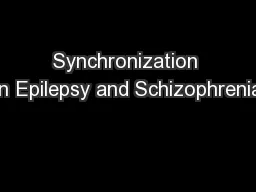PPT-Schizophrenia Topic Discussion By Alexandria Brown
Author : roxanne | Published Date : 2024-03-13
Overview What is Schizophrenia Etiology Pathophysiology Clinical Presentation Diagnosing Schizophrenia Treatment Options Treatment Guidelines Monitoring Schizophrenia
Presentation Embed Code
Download Presentation
Download Presentation The PPT/PDF document "Schizophrenia Topic Discussion By Alexa..." is the property of its rightful owner. Permission is granted to download and print the materials on this website for personal, non-commercial use only, and to display it on your personal computer provided you do not modify the materials and that you retain all copyright notices contained in the materials. By downloading content from our website, you accept the terms of this agreement.
Schizophrenia Topic Discussion By Alexandria Brown: Transcript
Download Rules Of Document
"Schizophrenia Topic Discussion By Alexandria Brown"The content belongs to its owner. You may download and print it for personal use, without modification, and keep all copyright notices. By downloading, you agree to these terms.
Related Documents














